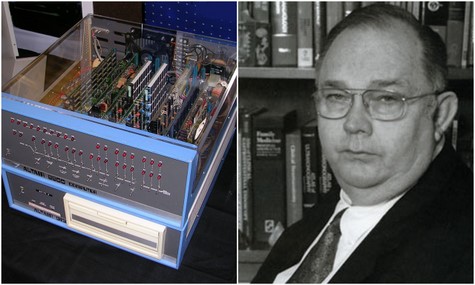Ed Roberts, MITS Altair creator dies, age 68


Ed Roberts, the man who created the machine which would jumpstart an industry that would ultimately be worth thousands upon billions of dollars, died on April 1, 2010 at the age of 68. (Photo: Spencer Smith, Wikipedia)
When the average citizen thinks about the pioneers of the personal computer industry, the names Bill Gates, Steve Wozniak and Steve Jobs probably come to mind. Some people who remember far back enough might even associate it also with Paul Allen, Microsoft's first CEO.
But not many people under the age of 40 would come up with the name Ed Roberts.
Click on the "Read the rest of this entry" link below for more.
The year was 1969. A small electronics parts supply company, Micro Instrumentation and Telemetry Systems (MITS) was founded by Ed Roberts, an electrical engineer, electronics enthusiast, former Air Force cryptography instructor and laser weapons researcher living in Albuquerque, New Mexico who wanted to become a medical doctor.
Eventually, larger competitors such as Texas Instruments, Canon and HP came into the space, and MITS found itself in financial difficulty.
Instead of trying to compete with these large firms with calculators, Roberts decided to move into low cost computers for hobbyists, sold mail order through publications such as Popular Electronics. What happened next was kismet and the beginning of what would eventually grow into a giant industry.
Roberts expected to sell only about 200 of these initial kits. In 1975, he had sold over 5000. In 1976 the company had over 230 employees and sales of $6M.
The machine that MITS created was the Altair 8800, a system that would be considered barely a general purpose computer and extremely primitive by today's standards, but in in 1975 it was revolutionary. The first units had a maximum of 8 Kilobytes of memory, a 2Mhz CPU clock speed and initially no disk storage.
Eventually, enthusiasts and MITS would increase the capacity and capabilities of the design.
All the first programs for the Altair, which were initially written in Intel 8088 machine language, had to be loaded in via the front console switches. This was a laborious process which could take days or weeks depending on the complexity of the program.
Eventually, this process was improved by adding cards that could allow the programmer to input via teletype by using a serial interface, paper tape or via audio cassette using analog pulse code modulation.
Matthew Broderick with the IMSAI 8080 in the 1983 film "Wargames".
Several systems that were copies of the Altair's S-100 bus design followed, such as the IMSAI (which was featured as a prop in the classic 1983 Sci-Fi movie "Wargames") as well as the introduction of other competitors in the space, such as the original Apple I designed by Steve Wozniak, the Tandy TRS-80 and the Commodore PET.
All of this historical information on this primitive computing machine would be relatively unimportant if it were not for the fact that Roberts had received a letter from two young college dropouts named Bill Gates and Paul Allen, who ran a tiny Seattle-based computer company (out of their parents homes) named "Micro-Soft".
The letter contained an offer to sell him a version of their BASIC interpreted programming language for his Altair.
In reality, Micro-Soft had no working BASIC code for the Altair, but Roberts took them up on the offer and Gates and Allen worked for 30 days straight programming on an Altair simulator on a DEC PDP-10 Mainframe and delivered the code on paper tape in person to Roberts in Albuquerque.
Also Read: Inside the Altair 8800 (TechRepublic)
I Remember the Altair and it Changed the World (ZDNet Government)
It didn't work on the first try, but after a second day of testing they got it to work. Altair Basic was the first product that Microsoft ever shipped. The rest, of course, is history.Roberts eventually did follow his lifelong dream and got his medical degree in 1986 at Mercer University after selling MITS in 1977, and retired to his home state of Georgia to become a gentleman farmer and country doctor in Wheeler County.
He developed a life-long friendship with Bill Gates and Paul Allen, who issued the following joint statement on April 1st, 2010 regarding Roberts' passing:
We are deeply saddened by the passing of our friend and early mentor, Ed Roberts, and our thoughts and prayers are with his family.
Ed was truly a pioneer in the personal computer revolution, and didn’t always get the recognition he deserved. He was an intense man with a great sense of humor, and he always cared deeply about the people who worked for him, including us. Ed was willing to take a chance on us – two young guys interested in computers long before they were commonplace – and we have always been grateful to him. The day our first untested software worked on his Altair was the start of a lot of great things. We will always have many fond memories of working with Ed in Albuquerque, in the MITS office right on Route 66 – where so many exciting things happened that none of us could have imagined back then.
More than anything, what we will always remember about Ed was how deeply compassionate he was – and that was never more true than when he decided to spend the second half of his life going to medical school and working as a country doctor making house calls. He will be missed by many and we were lucky to have known him.
Do you have any fond memories of Ed Roberts and the Altair? Talk Back and Let Me Know.